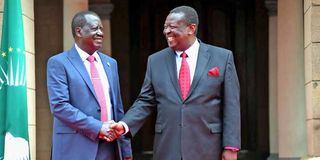Premium
Mudavadi: Raila AUC campaigns steady despite Harambee hiccup

Former Prime Minister Raila Odinga and Prime Cabinet Secretary Musalia Mudavadi before the press conference at Kenya Railways in Nairobi yesterday.
The government has given assurance on steady campaigns for former Prime Minister Raila Odinga’s quest for the chairmanship of the African Union Commission (AUC).
This follows confusion over an aborted fundraiser by a lobby group dubbed – Friends of Baba – Africa (Foba) which had claimed to be part of the campaigns for the continental post.
But Prime Cabinet Secretary (PCS) Musalia Mudavadi yesterday told Nation that the campaigns remain a State affair and are steady under the secretariat.
He said Mr Odinga’s campaign secretariat led by Foreign Affairs Principal Secretary Korir Sing’oei and former ambassador Elkanah Odembo is focused on delivering the seat to the country.
“This candidacy is not just a national mission but in many ways a continental one. Raila Odinga is not just Kenya’s candidate, he is Africa’s candidate,” Mr Mudavadi said.
The PCS, who is also the Cabinet Secretary for Foreign and Diaspora Affairs, noted that in Mr Odinga, Kenya presents a candidate who will give the AU visibility and a deserving place in global discourse.
He said the mission to capture the AUC position is a government initiative fronted by President William Ruto.
“Our President has led this mission from the front, engaging with leaders across the continent to ensure that Kenya’s candidate receives the endorsement and support necessary to secure this crucial position,” Mr Mudavadi said.
He noted that the candidate will continue with his continental engagements by travelling far and wide to present himself to the leadership of African states.
The ministry, he said, is the focal point for the candidate in his quest for the regional position.
Critical strategy
Foreign relations experts say there is need for a critical campaign strategy that focuses on three fronts; national, continental and global levels.
First Kenyan ambassador to Korea, Mr Ngovi Kitau, said that Kenya’s candidate must convince African Heads of States, that he has the clarity, knowledge, and gravitas needed to be an effective chief executive officer for Africa to win the seat in next year’s poll.
“Secondly, a comprehensive campaign strategy to rally support is necessary, at three levels; national, continental, and global. There’s dissonance at the national level which should be addressed,” he said.
Mr Ngovi told Nation that services of at least 40 special envoys are required, for a period of three months, to supplement normal diplomatic efforts, and fast-track effective campaigns ahead of the February 2025 polls.
“The role of the special envoys is to negotiate with the 16 countries and regions engaged in African Summitry, and to jump start the process for Raila’s one- on-one meetings with African Heads of State.”
He warned that Kenya stands to lose a lot if this bid fails and the failure will likely lead to diplomatic, economic, and political setbacks, including decline in foreign direct investments.
Professor of International Relations and Diplomacy Gilbert Khadiagala argues that presents a strong candidate “but in numbers and reputation alone, Kenya nominally seems to have the upper hand.”
“The major problem with mobilizing beyond Eastern/Southern Africa is the Francophone factor: most of the West African Francophone and Lusophone countries may not support the Kenyan candidate.
“Already these countries (under the aegis of the Islamic organization) have intimated they will not vote for a non-Francophone. So, unless the campaign focuses on overcoming this cultural/linguistic/religious schism, it is going to be difficult for Raila to prevail.”
Mr Odinga is facing Djibouti’s Minister of Foreign Affairs Mahmoud Youssouf, former Mauritius Foreign Minster Anil Kumarsingh Gayan and his former Madagascar counterpart Richard James Randriamandrato.
Mr Kitau says that Kenya lost in 2017 when some neighbors abandoned it while Southern African Development Community (SADC) countries abstained, thus the ongoing high-level diplomatic outreach should continue.
Read: Keep off Raila AU bid
“The traditional language dynamics such as Anglophone Vs Francophone needs to be addressed,” he advised.
He cautioned that African politics are often influenced by regional rivalries and alliances hence Kenya needs to carefully manage and navigate these complexities and build broad support across the continent.
“External factors such as the posture of countries like US, Britain, France, Russia, China, and blocs like EU and Brics, will have an impact on the outcome of this race,” he says.
He noted that the country’s peace and security remains its strength ahead of the AUC elections, as Kenya is a steady ally of all the 32 Nato members (Non-Nato ally).
“In addition, Kenya is leading the UN authorised Multinational Security Support Mission in Haiti. Kenya has also been elected to the United Nations Security Council (UNSC), as a non-permanent member three times.
“Kenyan mediators in Nairobi are currently involved in South Sudan’s Tumaini Initiative, launched in May to ensure South Sudan doesn’t revert to a civil war when general elections scheduled for December 2024 don’t happen and the precarious power sharing deal inked in 2018 expires in February 2025.”





